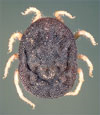£2.5m award helps scientists tackle tick list of diseases
Campers and hikers could be among those to benefit from a £2.5million bid to target the growing health risk posed by ticks.

Campers and hikers could be among those to benefit from a £2.5million bid to target the growing health risk posed by ticks.
Scientists at the University of Edinburgh aim to find new ways to prevent diseases transmitted by the tiny insect-like creatures, which cause misery for people who love the outdoors.
Researchers will seek to understand how viruses and bacteria, which are transmitted by ticks and which cause a range of human diseases, can survive for long periods of time within ticks without damaging them.
In parts of the world, ticks can transmit a number of severe and potentially deadly diseases to humans and animals, including Lyme disease, tick-borne encephalitis and Crimean-Congo haemorrhagic fever.
In Britain, cases of Lyme disease are dramatically increasing each year. In the rest of Europe, tick-borne encephalitis is now endemic in 27 countries, including Germany and Croatia.
Tick numbers are surging in Europe and scientists warn that changing climate patterns and increasing globalisation could enable them to spread into new areas.
The University of Edinburgh's Roslin Institute has received funding from the Wellcome Trust to establish the Roslin Wellcome Trust Tick Cell Biobank, the world's largest collection of tick cell lines, enabling scientists to carry out this advanced research.
The Tick Cell Biobank team and collaborators from seven other European countries have received further funding from the European Union to train a new generation of scientists specialising in ticks and their related diseases.
Project leader Professor John Fazakerley, based in the University of Edinburgh's Roslin Institute and Centre for Infectious Diseases, said: "Tick-transmitted infections are likely to be increasingly important in the future. Understanding these diseases and training scientists to undertake research on them is important for both human and animal heath".
For more information please call:
Norval Scott
Press and PR Office
Contact details


